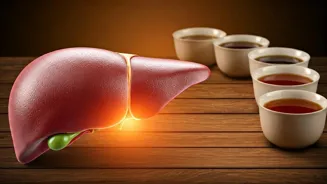Excessive Tea Intake
The first harmful habit identified by the AIIMS gastroenterologist is drinking too much tea. Consuming excessive amounts can put undue stress on the liver,
as it struggles to process the high volume of fluids and potential additives. Overloading the liver with liquids can lead to increased workload and decreased efficiency in detoxification processes. This can lead to inflammation and potential long-term damage, making the liver susceptible to various health problems. The key is moderation, enjoying tea in a balanced manner to avoid overburdening the liver and compromising its function. Finding the right balance ensures you can enjoy tea without compromising your liver’s health.
Drinking Very Hot Tea
Another problematic habit is drinking tea at very high temperatures. Consuming scalding hot tea can injure the delicate tissues of the esophagus and the stomach lining. Repeated exposure to high temperatures causes chronic inflammation, increasing the risk of cellular damage. This kind of consistent irritation can eventually lead to the development of conditions such as esophagitis and potentially raise the risk of certain cancers over time. It is always best to let your tea cool down slightly before sipping, reducing the risk of harm and promoting better digestive health.
Tea with Meals
A frequently overlooked bad habit is drinking tea while eating meals. This practice can interfere with the body's ability to absorb essential nutrients. The tannins in tea bind to iron and other minerals, preventing their full absorption in the digestive tract. This nutritional interference can be particularly harmful, potentially leading to deficiencies over time. Instead of drinking tea during meals, consider waiting at least an hour before or after eating to maximize nutrient absorption. This timing allows the body to properly absorb vitamins and minerals from your food, supporting overall health.
Using Poor Quality Tea
Using low-quality tea can also be detrimental to the liver. Substandard teas may contain higher levels of pesticides, heavy metals, and other contaminants. These harmful substances can place additional burdens on the liver, which has to work hard to detoxify them from the body. Regular consumption of low-quality teas can gradually impair liver function, increasing the risk of liver disease. Therefore, choosing high-quality teas from reputable sources is essential. This choice ensures that you are not introducing unnecessary toxins into your system. By prioritizing quality, you can better protect your liver and maintain good health.
Adding Excessive Sugar
Adding too much sugar to your tea is another damaging habit. The excess sugar in the drink can lead to increased blood sugar levels, which can contribute to the development of insulin resistance and non-alcoholic fatty liver disease (NAFLD). Chronic sugar intake can cause fat accumulation in the liver, leading to inflammation and liver damage. Cutting back on sugar or choosing natural sweeteners in moderation, is a wise decision. Avoiding sugary beverages and opting for less sweetened tea can make a significant difference in the health of the liver. Moderation is essential for preserving liver health and avoiding potential long-term complications.
Drinking Tea on Empty Stomach
Drinking tea on an empty stomach is another habit identified as harmful. Doing so can irritate the stomach lining, which in turn may cause digestive discomfort and increased acid production. The tannins in tea can worsen these effects, making it harder for your digestive system to function properly. Drinking tea before consuming any food can upset the stomach and reduce the benefits of consuming tea. Eating something first helps to create a protective barrier for the stomach, preventing irritation. This small adjustment can reduce digestive issues and ensure a more comfortable experience.
Consuming Tea Late Night
Another negative habit is drinking tea late in the evening. Tea contains caffeine, which is a stimulant that can disrupt sleep patterns. Poor sleep can negatively impact overall health, including the liver. It can lead to stress, inflammation, and other health issues. In addition, caffeine can interfere with liver function, making it less efficient at detoxification. Instead of drinking tea late at night, opt for a caffeine-free alternative, such as herbal teas. This change can improve your sleep quality and better support your liver's overall health.
Drinking Stale Tea
Consuming old or stale tea is a habit that poses some risks. Tea, if left for too long, can oxidize and accumulate bacteria or mold, especially if it's not stored correctly. Drinking tea that has been sitting for a while can expose your body to these harmful substances. This can lead to digestive issues or even potential infections. Therefore, it’s best to brew tea fresh, and discard any tea that has been sitting out for an extended period. This helps to avoid any health risks associated with consuming tea that is no longer fresh and safe.
Tea with Medications
Drinking tea with certain medications can cause negative interactions. The components in tea, like tannins, can interfere with the absorption or effectiveness of some medications. If you are taking any medications, it's important to consult with your doctor. You should ask them about potential interactions with tea and clarify whether there’s an appropriate time to drink tea to avoid affecting your medications. This preventive measure helps to ensure that your medications are as effective as possible. It also helps to avoid potential complications from any negative interactions with tea.
Ignoring Hydration Needs
A frequently overlooked issue is failing to properly balance tea consumption with overall hydration needs. Tea, in general, has a mild diuretic effect, potentially leading to increased fluid loss. This may make it hard to keep up with your body’s hydration needs. When drinking tea, it's crucial to balance it with adequate water intake. Make sure to drink plenty of water throughout the day. This will help maintain proper hydration and support liver function. Balancing your intake in this way helps prevent dehydration and supports the body’s natural detoxification processes, thus protecting your liver and promoting good health.














